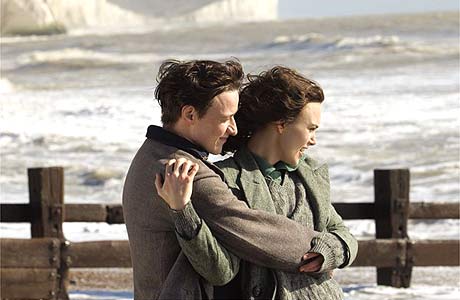
Ian McEwan’s novel is not an easy one to adapt to film. Sure, it’s got lots of high drama, of the sorts that usually lend themselves to the medium—World war! Tragic death! Star-crossed lovers! Hot sex! Class conflict! Rape! Delirium!—and yes, it does have an unusually high pedigree, being both a very popular and very good novel.
It’s also got a pretty idiosyncratic narrative structure which keeps a reader on his or her toes, showing the same events from different perspectives, and including a twisty shift or two which, on film, can be incredibly jarring, because the medium requires the attention of your ears and eyes to a higher degree than prose. That is, a reader is in much more control of how what they’re experiencing is perceived, while a film-viewer is at the mercy of the film itself to a greater degree when it comes to the sight and sound of things.
And man, there’s a shift in here that might knock you right out of your seat, if not the film itself for a moment.
Director Joe Wright is up to the challenge of difficult-to-succeed-at-adaptations-of-novels, of course, coming off the thoroughly charming 2005 Pride & Prejudice, the top of the heap of adaptations of that perennially popular British novel.
Wright is again working with his Elizabeth Bennet, Kiera Knightley, who here plays Cecillia Tallis, the older daughter of a reasonably well-off British family spending what will likely be her last summer in their old mansion. Her affair with James McAvoy’s Robbie Turner, the housekeeper’s son, is closely watched and not entirely understood by her l3-year-old sister Briony (Saoirse Ronan).
Briony is a brainy and imaginative child throwing herself into writing, but her imagination and proclivity for tale-telling causes trouble for the young lovers, the family and herself. Trouble of the life-ruining variety, which is where the title comes from, as the girl spends the rest of her life trying to atone for what she did (And we follow her for a while, as it takes two more actresses, 25-year-old Romola Garai and 70-year-old Vanessa Redgrave, to finish playing her).
The cast is uniformly excellent, but what really elevates the film from merely being a great film adaptation to being a great film in general is Wright’s way with a scene, his evocation of a place and time and his characters’ relationship within it.
While the events are mainly driven by words—a fact underscored by the sound of typing throughout, which becomes a sort of second soundtrack echoing Dario Marianelli’s portentous score—Wright wrings the greatest drama from the scenes completely bereft of them.
Scenes like Briony’s fascination with a bee trying to escape through a closed window, or her discovery of her older sister and Robby in their heated exchanges and, most especially, a bravura sequence in which Robbie, now fighting in World War II, stumbles upon the retreating British army on the beaches of Dunkirk.
“It’s like something out of the Bible,” one of them says when first looking down upon it, and then we’re plunged into one, long, panning, five-minute shot of the apocalyptic scene, the viewer quickly becoming as shell-shocked as the soldiers we see wandering through the madness there.
Any movie with a scene that powerful is one well worth paying attention to, and while it may be the most remarkable moment, it’s still only one of many remarkable moments.


I liked Ian McEwan’s “Saturday”, but haven’t read “Atonement” yet. My boy loved the novel and we’ve both heard great things about the film, but we share an aversion to Ikea Knightley. I’m enjoying your movie reviews! I like when music bloggers break out of their boxes. I’ve been trying to do the same myself when I have time. :)
Pingback: donewaiting.com » Blog Archive » Donewaitin.com Staff Favorites of 2007: Film
Pingback: Reel Suave